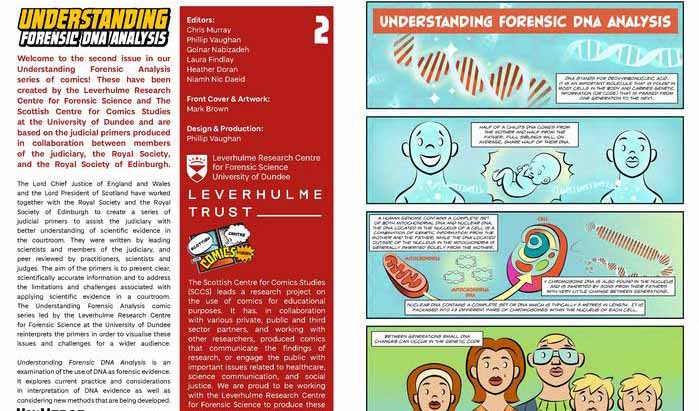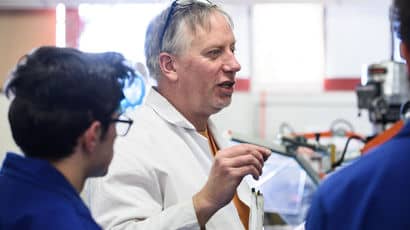Comics could help explain science in court, study finds

Comics explaining the complexities of forensic science in simple terms could improve understanding for jurors in court cases, research conducted at UWE Bristol suggests.
The study involving almost 100 volunteers participating as ‘jurors’ in mock trials found that access to comics designed to aid comprehension of forensic science led to greater detail in jury discussions about evidence and increased confidence in reasoning and conclusions.
Izzy Baxter, a student studying for an MSc Science Communication at UWE Bristol, undertook an analysis of data from mock trials organised by researchers at the University of Dundee.
The research involved conducting an analysis of the discussions of two groups of jurors: one group which received only an oral expert witness testimony, and a second group which had access to the expert witness testimony and comics explaining forensic science concepts.
In the group that read the comics, jurors made more explicit references to scientific concepts and demonstrated a better ability to connect forensic science to their final decision. In contrast, in the groups that received only the oral explanation, more misinterpretations of the evidence emerged, with misunderstandings related to the meaning of probability and margins of error, whereas the comics helped clarify these concepts. Additionally, discussions in the groups with comics were more balanced and participatory, with greater interaction among jurors.
Scientific literature suggests that understanding of science in courtrooms is often quite limited.
Dr Andy Ridgway, Senior Lecturer in Science Communication at UWE Bristol and one of the study’s authors, said the analysis was designed to explore whether comics could be a possible solution in helping explain key forensic techniques and aiding the legal process.
He said: “The decisions being taken by members of juries are just so vitally important and often they’re shaped by their understanding of the forensic evidence that’s being presented.
“Jurors often have little to no science background and frequently lack prior knowledge of the forensic techniques they are expected to assess in making their decision.”
The full academic paper has been published in the Journal of Science Communication.
Related news

23 January 2026
On-demand minibus services beneficial in rural areas but face financial challenges, trials suggest
Trials of ‘demand responsive transport’ minibus services boosted connectivity for people in rural and suburban areas, according to a new report produced by UWE Bristol researchers.

18 December 2025
UWE Bristol professor appointed National Institute for Health and Care Excellence CEO
Jonathan Benger CBE, Professor of Emergency Care at UWE Bristol, has been appointed as the new chief executive officer of the National Institute for Health and Care Excellence (NICE).

17 December 2025
Findings revealed from first UK study into experiences of mothers who are survivors of rape pregnancy
UWE Bristol academics have revealed the findings of the first UK-based study of the experiences of mothers who are survivors of rape pregnancy.

11 December 2025
Social media influencer work is far more demanding than it looks, research finds
A study exploring the mental health impacts of social media influencer work has revealed that life online is far more demanding than it appears.

25 November 2025
UWE Bristol experts join film Q&A exploring music and melodrama
Academics will take part in the Cary Comes Home Festival, with a post-screening Q&A exploring music, melodrama and emotional storytelling in classic cinema.

17 November 2025
Urgent reform needed to support ambulance-delivered end of life care, study finds
More than three quarters (78 per cent) of paramedics sometimes fear doing the wrong thing when caring for people in the last year of life, new research has found.

13 November 2025
Bristol’s screen industry experiences “boom-and-bust cycle” after post-pandemic recovery, new research from UWE Bristol finds
New research from UWE Bristol provides detailed insight into Bristol's screen sector.

13 November 2025
New AI research to revolutionise animal welfare
A UWE Bristol research project will combine behavioural science and AI to create technology that understands not only what animals do, but how they feel.

10 November 2025
Lessons from Low Traffic Neighbourhoods will drive better public engagement, study finds
Lessons from Low Traffic Neighbourhoods have informed a new toolkit to improve engagement with the public on challenging local street issues.

06 November 2025
First-of-its-kind study aims to help more people spend their final days at home
A new study will explore how architectural design could support end-of-life care in domestic settings.

29 October 2025
UWE Bristol academic unveils breakthrough in energy-efficient AI at NATO science forum
Dr Jonathan Lancelot has developed a new form of AI that could transform how intelligent machines operate in space, defence, and remote environments.

15 October 2025
UK food needs radical transformation on scale not seen since Second World War, new report finds
A new report from the Agri-Food for Net Zero Network+ finds urgent action on food is needed if the UK is to reboot its flagging economy, save the NHS billions, ensure national food security, and meet climate commitments.
You may also be interested in

Find an expert
Media contacts are invited to check out the vast range of subjects where UWE Bristol can offer up expert commentary.

Media enquiries
Enquiries related to news releases and press and contacts for the media team.

Science Communication Unit (SCU)
The SCU is internationally renowned for its diverse and innovative activities, designed to engage the public with science.






